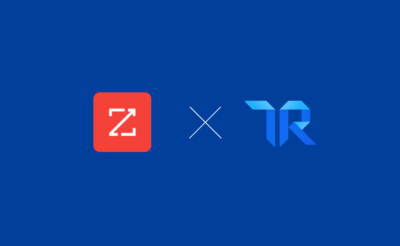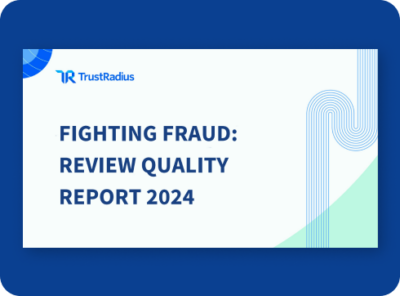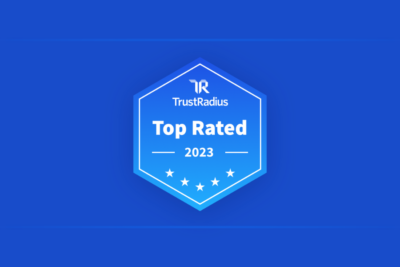Has the Pandemic Helped or Hindered Companies’ DEI efforts?
Two years on from the outbreak of COVID-19, the latest TrustRadius HR Trends Report presents a number of key revelations, especially when it comes to the state of diversity, equity, and inclusion (DEI) in the workplace. Even as the world emerges into a new post-COVID-19 reality, HR personnel are still facing a number of pandemic-related challenges.
“Visionary HR leaders have been working on their internal DEI efforts for years, understanding that DEI plays a strategic role in companies’ survival,” observes Illit Raz, CEO of Joonko, a platform that specializes in surfacing candidates from underrepresented sectors.
“However, multiple events in the past couple of years posed a few challenges, including the pandemic, the quick shift to remote work, and the Great Resignation,” she continues. “It seems that HR personnel are feeling the strain and are now seeking tech tools to help them deliver real cultural change to the workplace and meet their DEI goals.”
Indeed, these issues are highly interconnected, so it’s impossible to advance DEI without tackling the challenge of attracting and retaining top talent—and that’s regardless of whether or not you’re continuing with remote work policies or requiring everyone to come back to the office.
Diversity numbers aren’t all that, but standards are rising
As the workforce gets younger overall, more and more employees, both inside and outside the HR field, are holding their organizations to a higher standard for diversity practices.
This is reflected in the fact that, despite years of effort, fewer than two-thirds of HR personnel believe that their organization is diverse, and even fewer would agree that it’s equitable and inclusive.
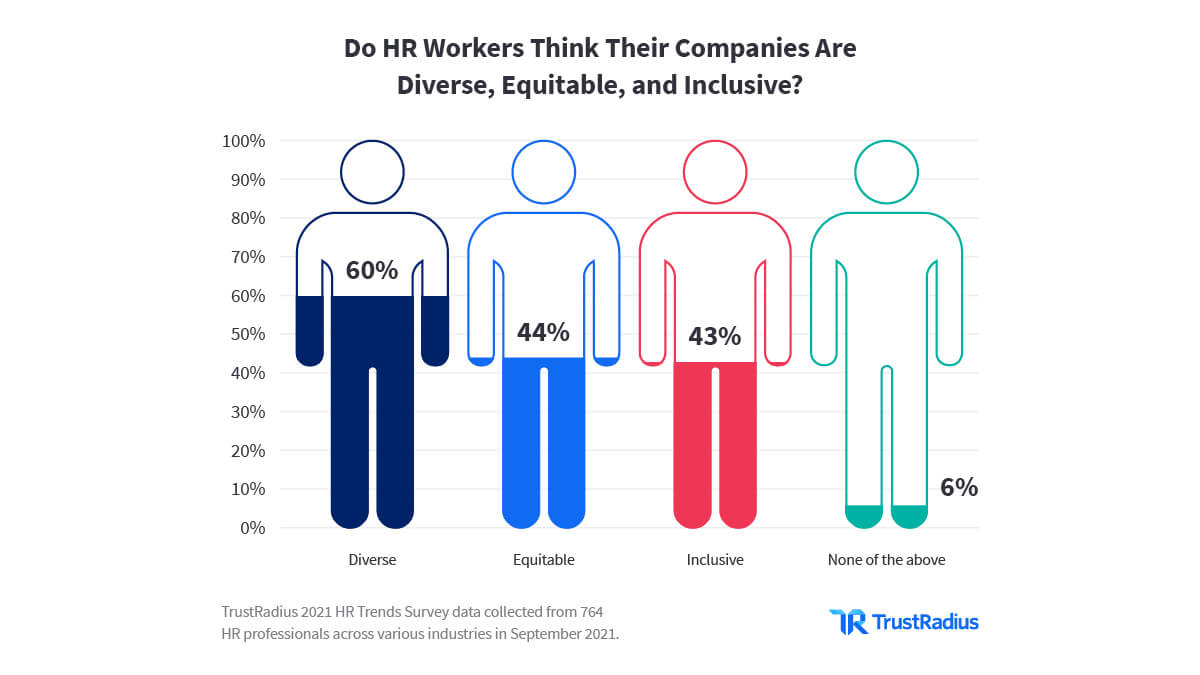
While it’s concerning that more than half of tech companies can’t meet their employees’ DEI expectations, it is also a positive sign of the growing sensitivity to the importance of these issues.
Gen Z workers are taking their place in the workforce for the first time, and they are far more concerned about diversity across the board. Gen Z has been termed the first “minority-majority” generation, with 48% identifying as non-white.
What’s more, Gen Z isn’t willing to pull any punches in the DEI department. They are looking for real commitment, not tokenism; they’re fine with having “awkward” conversations about diversity in their job interviews, and they will turn down a job offer if they feel the company doesn’t meet their standards.
“They say you’re interviewing the interviewer,” Mia Character, 22, a University of California at Berkeley alum, tells the Washington Post. “If the interviewer is turned off by that, it’s a huge flag for me. As a Black woman in the workplace, I want to make sure I’m entering spaces I’m comfortable in.”
The Great Resignation casts a long shadow
It’s clear by now that the Great Resignation is more than a meme—it’s a real phenomenon. While it has evolved in recent months as companies are less eager to hire amid recent economic uncertainty, the lessons of the Great Resignation are here to stay. What’s less clear is what will happen to diversity efforts when companies are desperate for talent in a job seekers’ market.
Aubrey Blanche, Culture Amp’s Senior Director of Equitable Design, Product & People, argues that the Great Resignation has been overwhelmingly negative for tech diversity. “Building representation and an inclusive culture are complex system-level problems,” she says, explaining that “when one part of the system gets disrupted, it can have cascading and magnifying effects on your culture.“
There’s a real risk that we’ll see previous diversity improvements disappear as corporate culture is thoroughly rewritten following the disruption of the pandemic and shift to remote or hybrid work.
However, more optimistic voices point out that companies rewriting their cultural playbooks have an opportunity to bake in more diversity best practices. It’s encouraging to think that Gen Z’s business ethics ideals are putting the onus on HR teams to move DEI further up their list of priorities.
Remote work improves DEI, but it’s no silver bullet
At the beginning of the pandemic, there was a lot of hope that the shift to remote work would drive DEI. But data from TrustRadius’ HR Trends Report suggests that the actual impact has been mixed.
It’s striking that employees at remote companies are more likely to rank their company highly for DEI than those at office-only organizations. In fact, whether or not the workforce is remote made a bigger difference to the perceived inclusiveness of an organization than the gender or race of the employees.
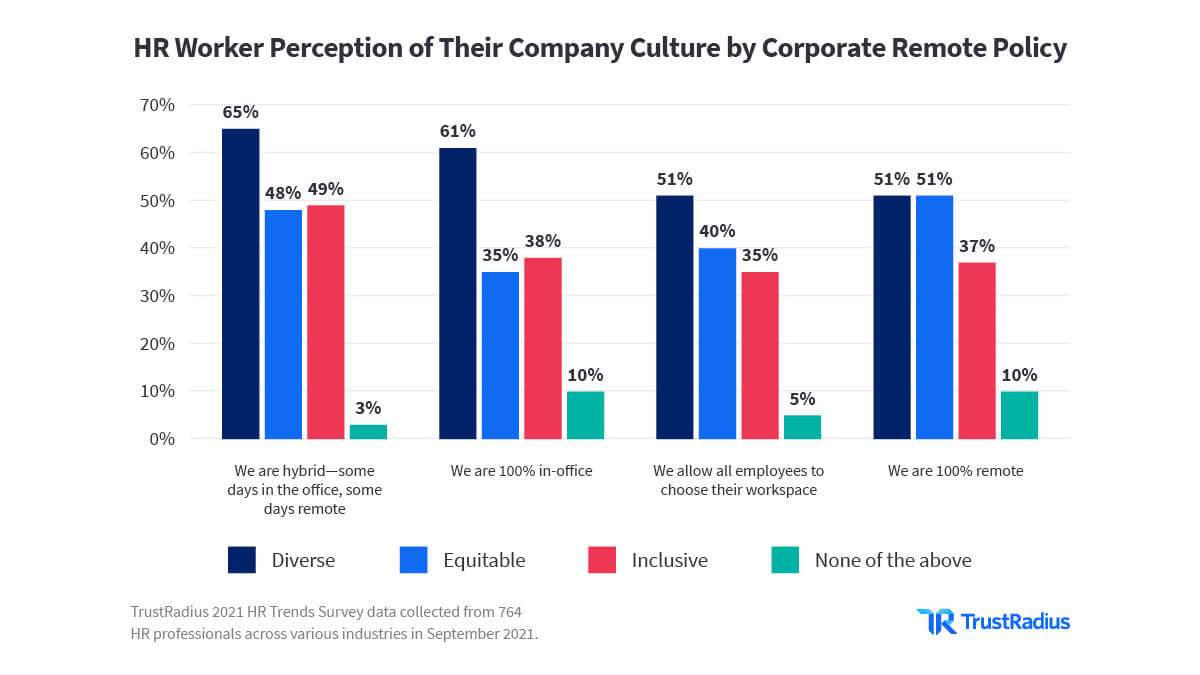
But flexible work isn’t a magic spell for diversity. Tech companies are more likely to offer flexible working conditions and less likely to demand in-office presence, but their employees overwhelmingly rate them as less diverse than workers at non-tech companies, who are more likely to have to work on-premises.
At the same time, flexibility does make a big difference for female tech workers, in particular, as 50% more women than men said that a lack of flexibility is a primary factor in resignation decisions. The fact that so many resigning tech workers cite stressful working conditions adds to the importance of flex-work options.
HR professionals are looking to HR tech for help
The report reveals something that HR pros already know—they are exhausted, but gearing up for the challenges ahead. While around a third said they are exhausted and frustrated, similar numbers described themselves as excited and energized.
This readiness to meet DEI goals is translating into a jump in HR tech spending. HR teams are spending more on HR tech, offering a big opportunity for HR software companies—if they can step up to the plate and deliver the solutions that HR personnel are seeking.
“HR tech solutions can revolutionize the onboarding process, offering the possibility of a unique, personalized onboarding experience,” says Lya P, Marketing Manager at Cegid, which offers talent management solutions.
“Regarding employee retention, HR tech solutions help promote a more open management style,” she continues, “allowing managers to understand which skills make their employees perform and how to discuss and revise goals and expectations with continuous conversations.”
A potential inflection point for HR
Between the impact of the Great Resignation and ongoing difficulties, HR teams are facing a tough DEI challenge. They are preparing to meet it, looking for help, and are willing to spend money for the right tools, but opinion is still divided over the benefits of HR tech for DEI. Overall, there’s a big opportunity ahead for HR software that can clear the high HR bar.
